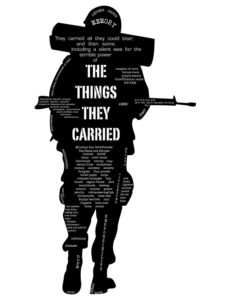People can carry weights of impossible magnitude that far outweigh any physical thing in this world. In Tim O’Brien’s novel The Things They Carried, the characters carry many things. As soldiers they must carry the weight of numerous weapons and supplies needed to fight a war in the middle of the jungle. However, this wight, while significantly heavy, is non-existent compared to the weights they carry emotionally and mentally. The soldiers in The Things They Carried bear the weights of the friends that died, the guilt and blame that comes with the responsibility of protecting each other, and the wight of the mental changes that war inflicts.
 One of the most devastating weights that the soldiers in O’Brien’s novel carry is bestowed upon them when they lose a comrade because of war. The weight of loss that soldiers experience is more intense than that of normal loss because it happens right in front of them and in gruesome manner. Also, the soldiers feel a sense of responsibility towards protecting each other, so when they are unable to do so they force themselves to carry the weights of blame and guilt because they feel that they let their comrades down. For example, when Curt Lemon dies, Rat Kiley is severely weighed down because of the way in which Lemon died. One minute he was there, the next minute he was pulverized and bits of him were hanging from the trees. The sudden and horrific nature of Lemon’s death is what weighs most on Rat Kiley and the other soldiers. Kiley is unable to carry this weight and act normally at the same time. This is why he mutilates the baby buffalo later on. The weight of Lemon’s terrible death is too much for him to be able to cope with it normally and it reduces his sensitivity and reactivity towards death and suffering, allowing him to carry out terrible acts like killing the baby buffalo. In other instances, the weight brought on by a fellow soldier’s death is guilt and self-blame. For instance, this is the weight that Jimmy Cross carries every time one of his platoon members dies. He blames himself when Ted Lavender dies because he was thinking about his old girlfriend. Even though there is very little he could have done to save Lavender, the responsibility for the lives of his men that he carries as their Lieutenant means that he also carries the blame for their deaths.
One of the most devastating weights that the soldiers in O’Brien’s novel carry is bestowed upon them when they lose a comrade because of war. The weight of loss that soldiers experience is more intense than that of normal loss because it happens right in front of them and in gruesome manner. Also, the soldiers feel a sense of responsibility towards protecting each other, so when they are unable to do so they force themselves to carry the weights of blame and guilt because they feel that they let their comrades down. For example, when Curt Lemon dies, Rat Kiley is severely weighed down because of the way in which Lemon died. One minute he was there, the next minute he was pulverized and bits of him were hanging from the trees. The sudden and horrific nature of Lemon’s death is what weighs most on Rat Kiley and the other soldiers. Kiley is unable to carry this weight and act normally at the same time. This is why he mutilates the baby buffalo later on. The weight of Lemon’s terrible death is too much for him to be able to cope with it normally and it reduces his sensitivity and reactivity towards death and suffering, allowing him to carry out terrible acts like killing the baby buffalo. In other instances, the weight brought on by a fellow soldier’s death is guilt and self-blame. For instance, this is the weight that Jimmy Cross carries every time one of his platoon members dies. He blames himself when Ted Lavender dies because he was thinking about his old girlfriend. Even though there is very little he could have done to save Lavender, the responsibility for the lives of his men that he carries as their Lieutenant means that he also carries the blame for their deaths.
The heaviest weight the soldiers in The Things They Carried carry is the emotional weights that they acquire because of the war. Whenever they lose a comrade, their emotional burden gets bigger. They carry the blame and responsibility, in their minds, for their buddies’ deaths and deal with the added load in different ways. This changes how they function and carries significant impact on the rest of their lives. Norman Bowker carries an emptiness in his life after returning from the war and is unable to rid himself of the blame from Kiowa’s death. This is a big reason why he ends up killing himself. He could not carry that weight anymore. This and the other examples of the soldiers’ inability to carry the weight that they gain shows how heavy the weights that they carry emotionally and mentally truly are. What they physically carry is, by comparison, lighter than air.

I really tried to emphasize how seriously soldiers are impacted by war and the atrocities that they experience, but I’m not sure if I explained my ideas fully or well enough in order to actually do this. I do think that I got all of my ideas out, even if they weren’t fully explained.
Pingback: grandpashabet
Pingback: grandpashabet